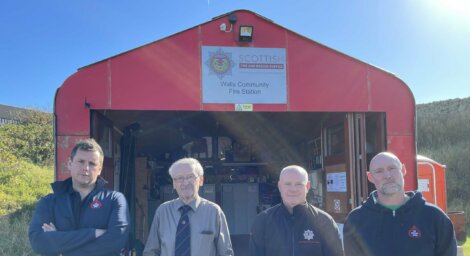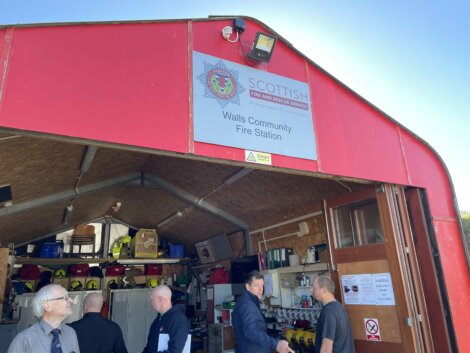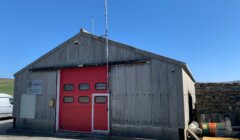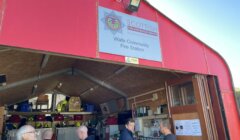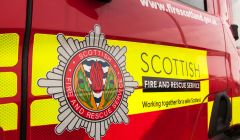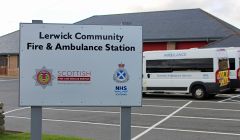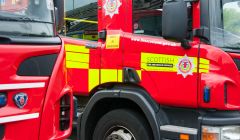News / Fire union member says Bressay and Walls among worst stations he has seen
Councillor Allison Duncan has called for urgent improvements to be made
BRESSAY fire station is the “worst station I have seen in 20 years”, according to a leading member of the Fire Brigade Union (FBU).
Regional secretary John McKenzie said the fire station in Walls was “second or third” among the worst stations he has experienced in two decades.
McKenzie visited the West Side station on Thursday morning along with FBU regional chairman Gus Sproul, Shetland fire commander Matt Mason and councillor Allison Duncan.
Duncan described the conditions at Walls as “atrocious” earlier this year, with the station essentially a shed – with no toilet or shower facilities.
He threatened to report the Bressay, Walls and Hillswick stations to the Health and Safety Executive if urgent improvements were not made.
And he repeated his threat today (Thursday) – giving Scottish Fire and Rescue Service (SFRS) until 30 November to begin upgrading its stations before he reports them.
“We have three fire stations in a deplorable condition,” he told Shetland News.
“It’s not good enough. These firefighters are looking after our communities, but they don’t even have the most basic facilities.
“There’s no toilet, there’s no showers – it’s an absolute disgrace.
“I’m not asking for new buildings, I’m not asking for gold-plated fire stations – I’m only asking for these basic amenities to be in place as and when required.”
He said he was pleased the two FBU reps had come to Shetland this week to see first-hand the “unacceptable situation” at the isles’ fire stations.
McKenzie and Sproul admitted they had come in for a shock.
Become a member of Shetland News
“I was really surprised when we got to Sumburgh because I thought, ‘this is a good facility’,” Sproul said.
“Lerwick was an excellent station.
“And then we saw Bressay, and today we’ve seen Bixter and Walls, which are all so far from being fit for purpose.”
McKenzie went one further, saying: “Bressay is the worst station I have seen in 20 years.
“Walls is close too, either second or third.”
The two union representatives have been in the isles on a three-day tour which is seeing them meet retained firefighters to hear their concerns, while also surveying whether their working conditions are up to scratch.
It comes as SFRS proceeds with its Shaping Our Future Service process – a key work that will decide the future of the fire brigade in Scotland – which went out to public consultation earlier in the year.
There have been stark warnings from SFRS that it faces serious financial challenges, and some fire stations – which it readily admits are not all fit for purpose – may have to close.
Other proposals include merging stations, while the jobs of frontline firefighters could be at risk.
Mason said the SFRS was currently considering its options, with their suggestions set to go out for public consultation again in December.
As he did earlier in the year, Mason readily admitted that “nothing is off the table” – including the closure of fire stations.
McKenzie was realistic, saying station closures “might be the result” of the consultation.
But he said if they were, SFRS had to produce a clear plan for the next 10 to 20 years – and it had to ensure “communities are kept safe”.
Sproul agreed: “These local firefighters are clearly really committed to what they do.
“The stark reality is that the challenge of funding may mean cuts need to be made.
“But this consultation can’t just be a paper exercise, and it will be unless it results in real change.”
The issue of a lack of shower facilities at Shetland’s fire stations has reared its head at a time when research into the illnesses being contracted by firefighters across the country is making for uncomfortable reading.
Firefighters are 1.6 times more likely to die of cancer than the general public, the University of Central Lancashire found in 2023.
And it found firefighters were also developing cancer at much higher rates at younger ages than average.
They are also three times more likely to suffer from depression, and twice as likely to deal with anxiety.
It is believed this is because of the decontaminants that firefighters deal with at the scene of a fire, or car accident, with FBU publishing guidance for what they should do after leaving an incident.
One of the key tenets of this is to shower before travelling home – impossible at stations like Walls and Bressay.
Duncan said it was “paramount” that they were able to look after the health and safety of Shetland’s firefighters.
And McKenzie agreed, saying it was “non-negotiable” for fire stations to have no toilets or showers in the modern day.
“That means these contaminants are being spread in the car, they’re maybe being spread at work, or they’re then being spread at home,” he said.
“All the research shows there’s an increased risk of dying.
“It’s just not acceptable to expose these firefighters to those risks.”
Become a member of Shetland News
Shetland News is asking its readers to consider paying for membership to get additional perks:
- Removal of third-party ads;
- Bookmark posts to read later;
- Exclusive curated weekly newsletter;
- Hide membership messages;
- Comments open for discussion.
If you appreciate what we do and feel strongly about impartial local journalism, then please become a member of Shetland News by either making a single payment, or setting up a monthly, quarterly or yearly subscription.






